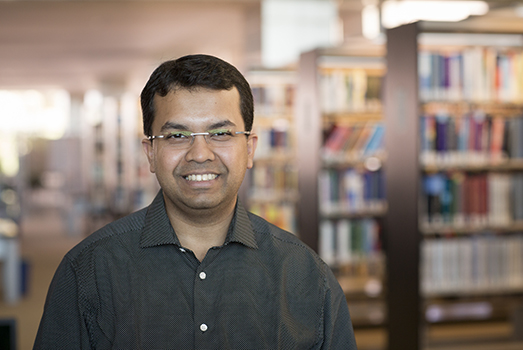Hussain elected APS Fellow

KAUST Associate Professor of Electrical Engineering Muhammad Mustafa Hussain was elected as a fellow of the American Physical Society (APS). Photo by Nicholas Demille.
Muhammad Mustafa Hussain, KAUST associate professor of electrical engineering, was elected as a fellow of the American Physical Society (APS) in September. APS, headquartered in College Park, Maryland, U.S., is a non-profit organization that advances and spreads the knowledge of physics around the world through its academic journals, educational and outreach activities and scientific meetings. Over 51,000 physicists are members worldwide.
The title was given to Hussain based on the recommendation of the Forum on Industrial and Applied Physics for his outstanding contributions to physics, and is especially significant due to Hussain’s accomplishments at a young age.
The award recognizes Hussain’s “contributions to [the] exploration, evaluation, and transition of planar and non-planar high-k/metal gate complementary metal oxide semiconductor electronics, silicon/silicon-germanium/III-V nanotube devices, and flexible, stretchable, reconfigurable complementary metal–oxide–semiconductor electronic systems,” according to the APS’s website.

Hussain studied at The University of Texas at Austin (U.S.) from 2003-2005, completing both his master’s degree and Ph.D. in solid-state electronics within the area of electrical and computer engineering there. Upon joining KAUST in 2009, he founded the University’s Integrated Nanotechnology Laboratory. He has won 37 research awards and both Intel and Samsung have adapted his work on CMOS technology.
“I am excited about the award—I believe that over time, recognitions follow one’s work, but it is always gratifying to see early recognition, which keeps us inspired. More importantly, being part of a recently established university like KAUST makes the award even more gratifying. I hope every member of the University’s faculty is a global leader in his or her field—there is no alternative to dreaming big and being a trendsetter,” Hussain said.
- By Caitlin Clark, KAUST News
Muhammad Mustafa Hussain, KAUST associate professor of electrical engineering, was elected as a fellow of the American Physical Society (APS) in September. APS, headquartered in College Park, Maryland, U.S., is a non-profit organization that advances and spreads the knowledge of physics around the world through its academic journals, educational and outreach activities and scientific meetings. Over 51,000 physicists are members worldwide.
The title was given to Hussain based on the recommendation of the Forum on Industrial and Applied Physics for his outstanding contributions to physics, and is especially significant due to Hussain’s accomplishments at a young age.
The award recognizes Hussain’s “contributions to [the] exploration, evaluation, and transition of planar and non-planar high-k/metal gate complementary metal oxide semiconductor electronics, silicon/silicon-germanium/III-V nanotube devices, and flexible, stretchable, reconfigurable complementary metal–oxide–semiconductor electronic systems,” according to the APS’s website.

KAUST Associate Professor of Electrical Engineering Muhammad Mustafa Hussain and his research team created a paper-based sensor from low-cost and commonly available household materials that mimics the sensory functions of human skin. Read more here. File photo.
Hussain studied at The University of Texas at Austin (U.S.) from 2003-2005, completing both his master’s degree and Ph.D. in solid-state electronics within the area of electrical and computer engineering there. Upon joining KAUST in 2009, he founded the University’s Integrated Nanotechnology Laboratory. He has won 37 research awards and both Intel and Samsung have adapted his work on CMOS technology.
“I am excited about the award—I believe that over time, recognitions follow one’s work, but it is always gratifying to see early recognition, which keeps us inspired. More importantly, being part of a recently established university like KAUST makes the award even more gratifying. I hope every member of the University’s faculty is a global leader in his or her field—there is no alternative to dreaming big and being a trendsetter,” Hussain said.
- By Caitlin Clark, KAUST News

